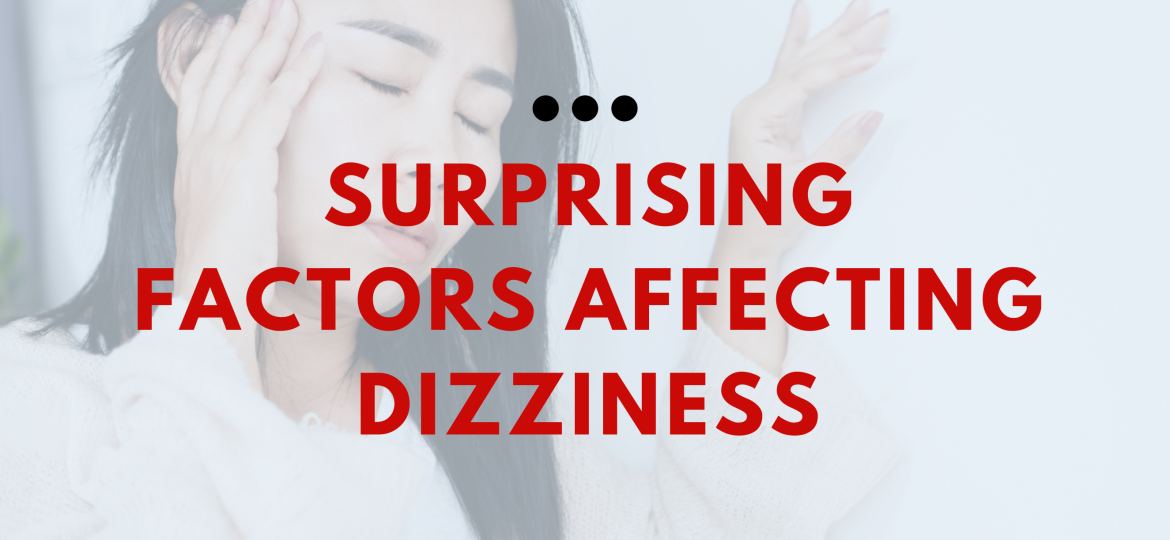
This blog post was written by Robin Mulvey, a Core Physical Therapy PT who specializes in vestibular health.
“Dizziness” is a term that is used to describe a wide variety of symptoms including disorientation, lightheadedness, vertigo, motion-sickness, or feeling unbalanced. For many, these symptoms may come and go, where it “flares up” at times or varies day to day.
Trying to decipher these seemingly random fluctuations in symptoms can feel, for lack of a better word, dizzying. But these fluctuations in dizziness symptoms don’t just happen at random. There are many documented factors that have a direct effect on the vestibular system, which can impact when and how hard the dizziness hits.
Understanding a few of these key factors can help you gain more in control of your dizziness and feel better faster.
Some of them may surprise you!
1. Atmospheric Pressure Changes
Blame it on the weather. The vestibular system is a fluid-filled organ that senses gravity and motion based on fluid pressures within the inner ear. Atmospheric pressure changes that occur with the changing seasons or big shifts in temperature can impact the vestibular system’s fluid pressure balance, making dizziness symptoms more intense. It’s a similar effect with seasonal allergies or sinus infections- increased sinus pressure alters the fluid pressures within and around the vestibular system, leading to dizziness flare-ups.
Unfortunately, we can’t control the weather. But we can watch the weather patterns for big pressure shifts to help anticipate and prepare for future flare-ups. Short-term use of decongestant nasal sprays can sometimes be used to manage symptoms, but never for more than three days in a row. Decongestants can have negative side effects, so be sure to consult with your provider before trying this option.
2. Anxiety and Stress
Fun fact: The experience of dizziness and the experience of anxiety/stress both light up the same neural pathway in the brain. They both activate the sympathetic nervous system, which is our “fight, flight, or freeze” response. This means that anxiety/stress can ramp up dizziness episodes, and dizziness can ramp up anxiety/stress levels. With dizziness and stress/anxiety being so closely interwoven, it can feel like a never-ending doom spiral. But understanding this connection is actually the key to breaking the cycle.
The antidote to a raging sympathetic nervous system is to activate its counterpart: the parasympathetic nervous system. This is our “rest and digest” response, helping us relax into a more calm and grounded state. There are many mind-body practices that help achieve this state and decrease dizziness severity, but the easiest and most effective method is breathwork. If you’re new to breathwork, try this exercise: Sit or lay down in a quiet space, and place your hands on your lower ribcage. Inhale through your nose for 5 seconds, imagining all the air going to the areas under your hands. Hold that breath in for 5 more seconds. Exhale slowly through your mouth for 7 seconds. Rinse and repeat.
3. Neck Tension
Since dizziness is a symptom that is felt inside the head, it’s easy to forget that there are also areas of the body outside of the head that can cause dizziness. The muscles of the neck are home to a reflexive nerve pathway that connect into the vestibular system, helping stabilize the head when the body is moving. When the neck muscles are holding excess tension, this reflex loses its ability to create the sensation of stability and can make dizziness symptoms feel more intense.
Manual therapies like myofascial release are very effective at eliminating excess tension in the neck, which can help significantly decrease dizziness symptoms. Vestibular therapy also uses specialized neck/head exercises to help the reflex function return to normal. (Pro tip: Core PT has two physical therapists who can provide both myofascial release and vestibular therapy treatments – check out the bio pages of Dr. Kirsten Radke and Dr. Robin Mulvey for more info!)
4. Sleep Deprivation
Studies have shown that poor sleep quality can increase the severity of dizziness. One theory is that sleep deprivation triggers the stress response in the brain and ramps up the sympathetic nervous system (the “fight, flight, or freeze” response), feeding into that same stress/dizziness spiral discussed earlier. There is also evidence that the vestibular system has neural connections to the part of the brain that controls the circadian rhythm, further suggesting that sleep quality can influence vestibular function. Improving your sleep hygiene habits can help decrease your dizziness symptoms.
Make sure your bedroom is dark, quiet, and at a comfortable temperature. Avoid screens for at least 30 minutes prior to going to bed, or wear blue-light blocking glasses in the evening. Avoid sugar-heavy meals, caffeine, or alcohol before bed. Try a relaxing meditation to help ease you to sleep. These will all help prime your body for a deeper, more restful sleep.
5. Vitamin and Mineral Deficiencies
It’s well documented that nutrition has a massive impact on every system of the body. The vestibular system is no different. Deficiencies in certain vitamins and minerals, specifically magnesium, vitamin B6, and vitamin D, can all affect vestibular function and lead to increased dizziness. Magnesium and vitamin B6 supplementation have been shown to help treat central causes of dizziness like vestibular migraine, and vitamin D supplementation has been shown to help decrease BPPV reoccurrence rates by up to 24%.
Before you run off to buy bottles of supplements, start with food. Seeking out whole foods that are high in magnesium, vitamin B6 and vitamin D will ensure that you are getting the most bioavailable form of these nutrients. Foods high in magnesium include green leafy vegetables, almonds, chia seeds, pumpkin seeds, avocados, and potatoes. Foods high in vitamin B6 include fish like salmon or tuna, chicken, beef, pistachios, and sunflower seeds. Foods high in vitamin D include fish like salmon or tuna, egg yolks, and mushrooms. If you want to try supplements, be sure to consult your provider before starting to avoid possible medication interactions.
Dizziness is a complex symptom. It rarely has just one “root cause,” and instead has many puzzle pieces that make up the whole picture. Knowing how a few of these pieces fit together to increase or decrease the severity of your symptoms can keep you in the driver’s seat when navigating your dizziness experience. For more help navigating your personal dizziness experience, schedule an appointment with one of Core’s vestibular specialists today!
References:
Saeed BMN, Omari AF. Climatic variations and benign paroxysmal positional vertigo. J Otol. 2016 Mar;11(1):33-37. doi: 10.1016/j.joto.2016.03.002. Epub 2016 Mar 19. PMID: 29937808; PMCID: PMC6002593.
Saman Y, Bamiou DE, Gleeson M, Dutia MB. Interactions between Stress and Vestibular Compensation – A Review. Front Neurol. 2012 Jul 27;3:116. doi: 10.3389/fneur.2012.00116. PMID: 22866048; PMCID: PMC3406321.
Goldberg JM, Cullen KE. Vestibular control of the head: possible functions of the vestibulocollic reflex. Exp Brain Res. 2011 May;210(3-4):331-45. doi: 10.1007/s00221-011-2611-5. Epub 2011 Mar 26. PMID: 21442224; PMCID: PMC4157641.
Kim SK, Kim JH, Jeon SS, Hong SM. Relationship between sleep quality and dizziness. PLoS One. 2018 Mar 7;13(3):e0192705. doi: 10.1371/journal.pone.0192705. PMID: 29513688; PMCID: PMC5841657.
Martin T, Moussay S, Bulla I, Bulla J, Toupet M, Etard O, Denise P, Davenne D, Coquerel A, Quarck G. Exploration of Circadian Rhythms in Patients with Bilateral Vestibular Loss. PLoS One. 2016 Jun 24;11(6):e0155067. doi: 10.1371/journal.pone.0155067. PMID: 27341473; PMCID: PMC4920359.
Chiarella G, Marcianò G, Viola P, Palleria C, Pisani D, Rania V, Casarella A, Astorina A, Scarpa A, Esposito M, Salerno M, Di Nunno N, Bolcato M, Piscopo A, Cione E, De Sarro G, Di Mizio G, Gallelli L. Nutraceuticals for Peripheral Vestibular Pathology: Properties, Usefulness, Future Perspectives and Medico-Legal Aspects. Nutrients. 2021 Oct 18;13(10):3646. doi: 10.3390/nu13103646. PMID: 34684646; PMCID: PMC8538675.
